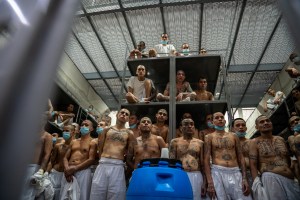UPDATE: In an astonishing media event, YouTube influencers are being granted access to the notorious Terrorism Confinement Center (CECOT) in El Salvador, a supermax prison known for its brutal conditions. This unprecedented tour, organized by President Nayib Bukele‘s administration, allows content creators to document the harsh realities of imprisonment for millions of viewers worldwide.
The event highlights a disturbing trend as social media personalities are welcomed into spaces that traditional journalists are frequently barred from. Visitors, including Turkish YouTuber Alper Rende, captured shocking footage inside the prison, which holds around 40,000 inmates, with current occupancy estimated at one-third of capacity. Rende’s recent video has already amassed over 10 million views, making it his most popular content of 2024.
The CECOT prison, the first of its kind in Central America, was established under a controversial state of emergency following a gang massacre that claimed 62 lives on March 26, 2022. The facility is designed to house gang members and is characterized by overcrowded conditions, with inmates sharing cells that offer less than 0.58 square meters of personal space. Critics compare it to a “human vending machine,” raising serious human rights concerns.
During the tour, the director of CECOT proudly declared, “The people who we put in here will never come back out.” This chilling sentiment underscores the Bukele administration’s aggressive approach to crime, which has led to the incarceration of almost 2% of El Salvador’s entire population without due process. Activist Samuel Ruiz condemned the policy, stating, “Anyone can just point their finger at you, and you are in prison, it’s as quick as that.”
The government’s strategy has garnered both domestic and international attention, with public sentiment largely supporting harsh measures against gang violence. As media outlets face limitations, YouTubers are stepping into a role that shapes public opinion. Sonja Wolf, an expert on gang control in El Salvador, noted that uncritical media portrayals contribute to narratives that demonize gang members and justify draconian policies.
The bizarre spectacle of influencers taking selfies with inmates has drawn significant criticism, yet it resonates with a public eager for sensational content. Onur Uygur, director of the Turkish content agency RND House, defended the approach, stating, “Our job is to do what our viewers want to see.” The content created during this event further perpetuates the government’s “super mano dura” (iron fist) image, which Bukele’s administration has embraced since taking office.
As international scrutiny of human rights violations escalates, the dynamics of media representation in El Salvador are shifting dramatically. While traditional journalism faces barriers, YouTubers are positioned to either amplify or undermine critical issues surrounding justice and human rights in the country.
This developing story is raising urgent questions about the ethics of media representation in such a fraught environment, and observers are keen to see how the narrative around CECOT unfolds in the coming days. Will YouTube content creators continue to shape the public discourse, or will traditional journalism reclaim its role in shedding light on these vital issues?
Stay tuned for further updates as the situation evolves.
